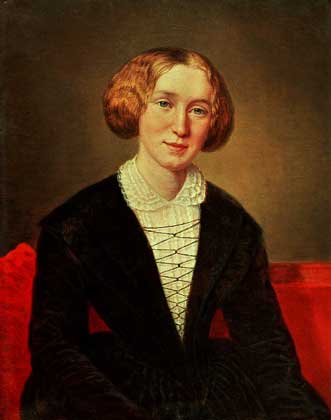The directory «Plots»
Eliot, George
(pseud. of Mary Ann or Marian Evans)
(1819–1880)

English novelist, b. Arbury, Warwickshire. One of the great English novelists, she was reared in a strict atmosphere of evangelical Protestantism but eventually rebelled and renounced organized religion totally. Her early schooling was supplemented by assiduous reading, and the study of languages led to her first literary work, Life of Jesus (1846), a translation from the German of D. F. Strauss. After her father’s death she became subeditor (1851) of the Westminster Review, contributed articles, and came to know many of the literary people of the day. In 1854 she began a long and happy union with G. H. Lewes, which she regarded as marriage, though it involved social ostracism and could have no legal sanction because Lewes’s estranged wife was living. Throughout his life Lewes encouraged Evans in her literary career; indeed, it is possible that without him Evans, subject to periods of depression and in constant need of reassurance, would not have written a word.
In 1856, Mary Ann began Scenes of Clerical Life, a series of realistic sketches first appearing in Blackwood’s Magazine under the pseudonym Lewes chose for her, George Eliot. Although not a popular success, the work was well received by literary critics, particularly Dickens and Thackeray. Three novels of provincial life followed—Adam Bede (1859), The Mill on the Floss (1860), and Silas Marner (1861). She visited Italy in 1860 and again in 1861 before she brought out in the Cornhill Magazine (1862–63) her historical romance Romola, a story of Savonarola. Felix Holt (1866), a political novel, was followed by The Spanish Gypsy (1868), a dramatic poem. Middlemarch (1871–72), a portrait of life in a provincial town, is considered her masterpiece. She wrote one more novel, Daniel Deronda (1876); the satirical Impressions of Theophrastus Such (1879); and verse, which was never popular and is now seldom read. Lewes died in 1878, and in 1880 she married a close friend of both Lewes and herself, John W. Cross, who later edited George Eliot’s Life as Related in Her Letters and Journals (3 vol., 1885–86). Writing about life in small rural towns, George Eliot was primarily concerned with the responsibility that people assume for their lives and with the moral choices they must inevitably make. Although highly serious, her novels are marked by compassion and a subtle humor.
Great Britain, 1980, George Eliot (The Mill on the Floss)
Great Britain, 1980.07.9,  Nuneaton. Centenary of George Eliot
Nuneaton. Centenary of George Eliot